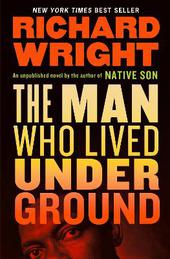
|
The Man Who Lived Underground
Hardback
Main Details
| Title |
The Man Who Lived Underground
|
| Authors and Contributors |
By (author) Richard Wright
|
| Physical Properties |
| Format:Hardback | | Pages:250 | | Dimensions(mm): Height 210,Width 140 |
|
| Category/Genre | Modern and contemporary fiction (post c 1945) |
|---|
| ISBN/Barcode |
9781598536768
|
| Classifications | Dewey:813.52 |
|---|
| Audience | |
|---|
|
Publishing Details |
| Publisher |
The Library of America
|
| Imprint |
The Library of America
|
| Publication Date |
20 April 2021 |
| Publication Country |
United States
|
Description
A major literary event- an explosive, previously unpublished novel from the 1940s by the legendary author of Native Son and Black Boy. **NEW YORK TIMES BEST SELLER** A major literary event- an explosive, previously unpublished novel about race and police violence by the legendary author of Native Son and Black Boy Fred Daniels, a Black man, is picked up by the police after a brutal double murder and tortured until he confesses to a crime he did not commit. After signing a confession, he escapes from custody and flees into the city's sewer system. This is the devastating premise of this scorching novel, a masterpiece that Richard Wright was unable to publish in his lifetime. Written between his landmark books Native Son(1940) and Black Boy (1945), at the height of his creative powers, it would eventually see publication only in drastically condensed and truncated form in the posthumous collection Eight Men (1961). Now, for the first time, by special arrangement with the author's estate, the full text of this incendiary novel about race and violence in America, the work that meant more to Wright than any other ("I have never written anything in my life that stemmed more from sheer inspiration"), is published in the form that he intended, complete with his companion essay, "Memories of My Grandmother." Malcolm Wright, the author's grandson, contributes an afterword.
Author Biography
Richard Wright was born near Natchez, Mississippi, in 1908. As a child he lived in Memphis, Tennessee, then in an orphanage, and with various relatives. He left home at fifteen and returned to Memphis for two years to work, and in 1934 went to Chicago, where in 1935 he began to work on the Federal Writers' Project. He published Uncle Tom's Children in 1938 and was awarded a Guggenheim Fellowship in the following year. His other titles include his autobiography, Black Boy (1945), and The Outsider (1953). After the war Richard Wright went to live in Paris with his wife and daughters, remaining there until his death in 1960.
Reviews"Not just Wright's masterwork, but also a milestone in African American literature . . . The Man Who Lived Underground is one of those indispensable works that reminds all its readers that, whether we are in the flow of life or somehow separated from it, above- or belowground, we are all human." -Gene Seymour, CNN.com "It's impossible to read Wright's novel without thinking of this 21st-century moment. . . . Wright deserves sensitive reconsideration, especially now that so many of us have been proved naive in our belief that an honest rendering of Black people might lead to recognition of our existence in the universality of humanity." -Imani Perry, The Atlantic "Moves continuously forward with its masterful blend of action and reflection, a kind of philosophy on the run. . . . Whether or not The Man Who Lived Underground is Wright's single finest work, it must be counted among his most significant." -Clifford Thompson, The Wall Street Journal "Enthralling. . . . You could say that the book's release now is timely, given that it contains an account of police torture. . . . But that feels false because Wright's story would have been just as relevant if it had been released 10 years ago or 30, 50, or 80-when he composed it. . . . Maybe, then, it's more accurate to think of The Man Who Lived Underground as timeless rather than timely." -The New Republic "Resonates deeply as a story about race and the struggle to envision a different, better world. A welcome literary resurrection that deserves a place alongside Wright's best-known work." -Kirkus (starred review) "Finally, this devastating inquiry into oppression and delusion, this timeless tour de force, emerges in full, the work Wright was most passionate about, as he explains in the profoundly illuminating essay, 'Memories of My Grandmother,' also published here for the first time. This blazing literary meteor should land in every collection." -Booklist (starred review) "The power and pain of Wright's writing are evident in this wrenching novel. . . . Wright makes the impact of racist policing palpable as the story builds to a gut-punch ending, and the inclusion of his essay 'Memories of My Grandmother' illuminates his inspiration for the book. This nightmarish tale of racist terror resonates." -Publishers Weekly "This astonishing novel [is at last] available to readers, fulfilling a dream Wright wasn't able to realize in his lifetime." -OprahDaily.com "To read The Man Who Lived Underground today - it arrives on April 20, intact for the first time, published by the posterity-minded Library of America - is to recognize an author who knew his work could be shelved for decades without depreciation. Because this is America. Because police misconduct, to use the genteel 2021 term, is ageless. Check the copyright page, read the production notes: Yes, this was written in 1941. Yes, it's 80 years later. Yes, Wright died in 1960, at 52, having never scaled again the commercial heights of Native Son. Yet somehow The Man Who Lived Underground found its way into bookstores at the right time." -The Chicago Tribune "This is a significant work of literary fiction from a legendary author that's absolutely not to be missed." -Book Riot
|